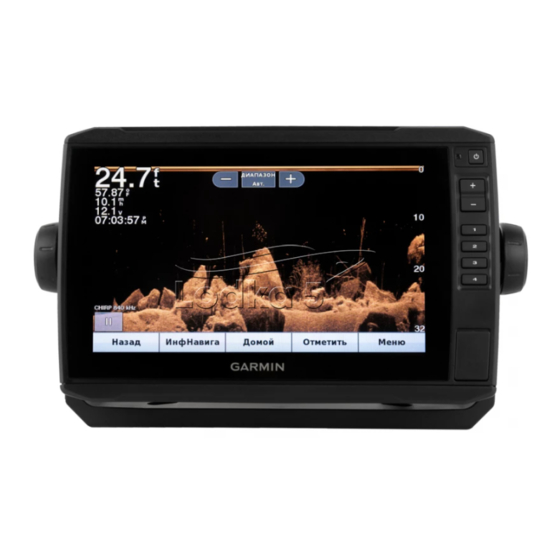Garmin echomap 40 series Instrukcja obsługi - Strona 33
Przeglądaj online lub pobierz pdf Instrukcja obsługi dla Morski system GPS Garmin echomap 40 series. Garmin echomap 40 series 50 stron. Vhf comm
Również dla Garmin echomap 40 series: Instrukcja instalacji (15 strony), Instrukcja obsługi (32 strony), Deklaracja zgodności (1 strony), Podręcznik pilota (22 strony), Instrukcja obsługi (30 strony)

If you want to know the water depth below the keel or the lowest
point of your boat and the transducer is installed at the water
line or anywhere above the end of the keel, measure the
distance from the transducer location to the keel of the boat.
If you want to know the true water depth and the transducer is
installed below the water line, measure the distance from the
bottom of the transducer up to the water line.
NOTE: This option is only available when you have valid depth
data.
1
Measure the distance:
• If the transducer is installed at the water line
anywhere above the end of the keel, measure the
distance from the transducer location to the keel of the
boat. Enter this value as a positive number.
• If the transducer is installed at the bottom of the keel
and you want to know the true depth of the water,
measure the distance from the transducer to the water
line. Enter this value in as a negative number.
2
Select Settings > My Vessel > Keel Offset.
3
Select
if the transducer is installed at the water line, or
select
if the transducer is installed at the bottom of the
keel.
4
Enter the distance measured in step 1.
5
Use the arrow keys to enter the keel offset measured in step
1.
Sailboat Autopilot Operation
When engaged, the autopilot controls only the rudder. You and
your crew remain responsible for the sails while the autopilot is
engaged.
In addition to heading hold, you can use the autopilot to maintain
a wind hold. You can also use the autopilot to control the rudder
while tacking and gybing.
Wind Hold
You can set the autopilot to maintain a specific bearing relative
to the current wind angle. Your device must be connected to a
NMEA 2000 or NMEA
0183 compatible wind sensor to perform
®
a wind hold or a wind-based tack or gybe.
Setting the Wind Hold Type
Before you can enable the wind hold type, you must connect a
NMEA 2000 or NMEA 0183 wind sensor to the autopilot.
For advanced autopilot configuration, see the installation
instructions included with your autopilot.
1
From the autopilot screen, select MENU > Autopilot Setup >
Wind Hold Type.
Gauges and Graphs
or
CAUTION
2
Select Apparent or True.
Engaging Wind Hold
Before you can enable the wind hold type, you must connect a
NMEA 2000 or NMEA 0183 wind sensor to the autopilot.
When the autopilot is in standby mode, select Wind Hold.
Engaging Wind Hold from Heading Hold
Before you can enable the wind hold type, you must connect a
NMEA 2000 or NMEA 0183 wind sensor to the autopilot.
With heading hold engaged, select MENU > Wind Hold.
Adjusting the Wind Hold Angle with the Autopilot
You can adjust the wind hold angle on the autopilot when wind
hold is engaged.
• To adjust the wind hold angle in increments of 1°, select
.
• To adjust the wind hold angle in increments of 10°, hold
.
Tack and Gybe
You can set the autopilot to perform a tack or gybe while
heading hold or wind hold is engaged.
Tacking and Gybing from Heading Hold
1
Engage heading hold
(Engaging the Autopilot, page
2
Select MENU > Tack/Gybe.
3
Select a direction.
The autopilot steers your boat through a tack or gybe.
Tacking and Gybing from Wind Hold
Before you can engage wind hold, you must have a wind sensor
installed.
1
Engage wind hold
(Engaging Wind Hold, page
2
Select MENU.
3
Select an option.
The autopilot steers your boat through a tack or gybe, and
information about the progress of the tack or gybe appears
on the screen.
Setting a Tack and Gybe Delay
The tack and gybe delay allows you to delay steering a tack and
gybe after you initiate the maneuver.
1
From the autopilot screen, select MENU > Autopilot Setup >
Sailing Setup > Tack/Gybe Delay.
2
Select the length of the delay.
3
If necessary, select Done.
Enabling the Gybe Inhibitor
NOTE: The gybe inhibitor does not prevent you from manually
performing a gybe using the helm or step steering.
The gybe inhibitor prevents the autopilot from performing a
gybe.
1
From the autopilot screen, select MENU > Autopilot Setup >
Sailing Setup > Gybe Inhibitor.
2
Select Enabled.
Gauges and Graphs
The gauges and graphs provide various information about the
engine and environment. To view the information, a compatible
transducer or sensor must be connected to the network.
Viewing the Compass
You can view information about your bearing, heading, and
route using the compass.
Select Gauges > Compass.
or
or
25).
27).
27
